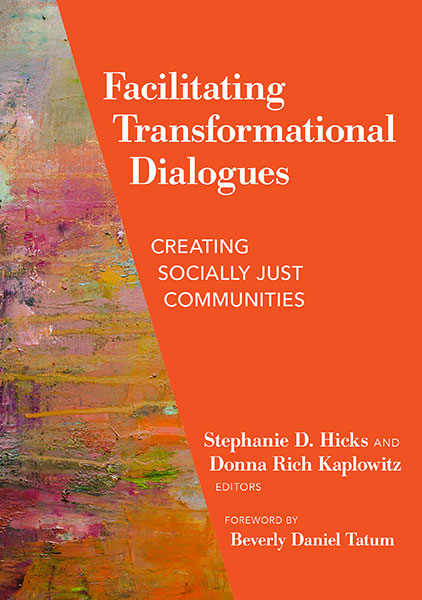Professors: Request an Exam Copy
Print copies available for US orders only. For orders outside the US, see our international distributors.
Edited by: Stephanie D. Hicks, Donna Rich Kaplowitz
Foreword by: Beverly Daniel Tatum
Publication Date: July 26, 2024
Pages: 208

This much-needed guide provides the specific skills and materials necessary to facilitate effective dialogues across identity differences.
We are living through arguably one of the most divisive times in our country and the world. People do not know how to communicate across differences in a way that advances the public good—from the international halls of power to local city governments to classrooms to family dinners. The consequences are devastating—from hate-fueled conflicts and mass shootings to teachers who do not know how to address problematic comments in the classroom.
This book responds to the urgent need to address complicated, intense, and oftentimes personal differences in a productive way. Written for both novice and experienced facilitators, it offers concrete materials to use in classrooms and other settings, along with anecdotes, vignettes, and hard-earned lessons based on the authors’ own experiences. By capturing conversations among leaders in the field and emergent practitioners, Facilitating Transformational Dialogues emanates optimistic energy and time-tested wisdom from the fields of Intergroup Relations and Intergroup Dialogue.
Book Features:
Stephanie D. Hicks is a lecturer at the Program on Intergroup Relations and a faculty affiliate of the Institute for Research on Women and Gender at the University of Michigan. Donna Kaplowitz is the LSA faculty co-director of The Program on Intergroup Relations at the University of Michigan, and coauthor of Race Dialogues: Tackling the Elephant in the Classroom.
“As this volume of essays demonstrates, dialogue (both intergroup and intragroup) is a uniquely powerful tool for bridging the empathy gap in our society. You can’t solve problems without talking about them. Learning how to have true dialogue is a necessary part of moving forward as a healthy society. Building the capacity of facilitators through resources such as Facilitating Transformational Dialogues is an important step toward achieving a more just world where everyone can thrive. The time is now.”
—From the Foreword by Beverly Daniel Tatum, president emerita, Spelman College
“These divisive and politically charged times call for strong resources that help us navigate the rough terrains of listening and understanding across difference. This book is a much-needed guide for anyone working to lead people in transformative dialogue for social change amidst challenges of power, privilege, and oppression.”
—Dorinda J. Carter Andrews, professor and chairperson, Department of Teacher Education, Michigan State University
“This book is a gem! It allows readers to hear from the giants in the field of dialogue. It is an invaluable resource for facilitators in multiple fields as it covers scenarios and techniques that can be used in college classrooms, high schools, and workplaces. I highly recommend this book as a teaching resource.”
—Brighid M. Dwyer, vice dean for diversity, equity, and inclusion, University of Pennsylvania School of Arts and Sciences
“Hicks and Kaplowitz have assembled a tremendously useful text to assist those pursuing dialogue across difference in today's polarized world, especially in the name of social justice. I especially appreciated that the chapters address those wishing to develop different types of dialogue programs as well as those in the throes of facilitating dialogue. The well-being chapter is particularly welcome. All of our facilitators will soon have a copy!"
—Sherry Perlmutter Bowen, faculty director, Dr. Terry Nance Center for Dialogue, Villanova University
Contents
Foreword Beverly Daniel Tatum ix
Acknowledgments xi
Introduction 1
1. Introduction to IGD: What Is IGD? 7
Kristie Ford and Kelley Maxwell
2. Key Identity Concepts for IGD Facilitators to Know 15
Section A: Key Social Identity Concepts for IGD Facilitators to Know 17
Sara Crider and Danny Alvarez
Section B: Privilege, Power, and Oppression—Core Terminology 25
Christina Morton and Meaghan Wheat
3. Intergroup Dialogue Facilitator Techniques 32
Section A: The Role of Facilitators 34
Deborah Slosberg and Monita Thompson
Section B: Equalizing Power Dynamics: Multipartiality, Dominant and Counter-Narratives 39
Christina Morton and Cesar Vargas-Leon
Section C: Challenging Dynamics in Intergroup Dialogue 47
Mark Chesler and Roger Fisher
4. Models of Dialogue 60
Section A: Co-Facilitator Observations From Faculty and Staff Intergroup Dialogues 62
Erika Crews, Michael Kaplowitz, and Charles “charlie” Liu
Section B: Facilitating Race Dialogues With High School Students 70
Roger Fisher and Donna Rich Kaplowitz
Section C: Online Dialogues: Their Benefits and Facilitation Challenges 76
Anna Yeakley
Section D: Setting the Context for Dialogue in the Workplace 81
Trey Boynton and Taryn Petryk
Section E: Dialogues in Instructor Development 85
Tazin Daniels and Shana Schoem
Section F: International Dialogue 89
Alice Mishkin and Rima Hassouneh
Section G: Just Sayin’—Some Opinions About Facilitation 93
Charles Behling
Section H: Dialogue and Movement Organizing 98
Sariah Metcalfe
5. Passing the Torch: An Intergenerational Dialogue About Dialogue 102
Participants:
Founders: Pat Gurin, Beverly Daniel Tatum, Ximena Zúñiga
Emerging Leaders: Emely Hernandez Rubio, Olivia “Ollie” Jayakar, Cesar Vargas-Leon, and Meaghan Wheat
6. Well-Being and Facilitation 115
adrienne maree brown and Stephanie Hicks
Appendix A: Insight 1: What Is Intergroup Dialogue? 133
Appendix B: Insight 2: Learning to Listen 135
Appendix C: Insight 3: Developing Community Guidelines 137
Appendix D: Insight 4: The Four Levels of Oppression 139
Appendix E: Insight 5: Facilitator Personal Assessment Chart 141
Appendix F: Insight 6: The Master/Dominant Narrative, Counter Narratives, and Multipartiality 144
Adapted from the works of Janet Rifkin, J.D., and Leah Wing, EdD
Appendix G: Insight 7: Intergroup Dialogue Facilitation 146
Appendix H: Insight 8: Strategies for Managing Hot Moments in the Classroom 148
Appendix I: Insight 9: Microaggressions—A Primer 150
Appendix J: Insight 10: Interrupting Bias—The PALS Approach 152
Appendix K: Insight 11: How to Apologize—Re-Aact 154
Appendix L: Strategies for Facilitating Intergroup Dialogue Online 155
Anna M. Yeakley
Appendix M: IGD Facilitation: Some Suggestions 161
References 167
Index 173
About the Editors and Contributors 179
Professors: Request an Exam Copy
Print copies available for US orders only. For orders outside the US, see our international distributors.